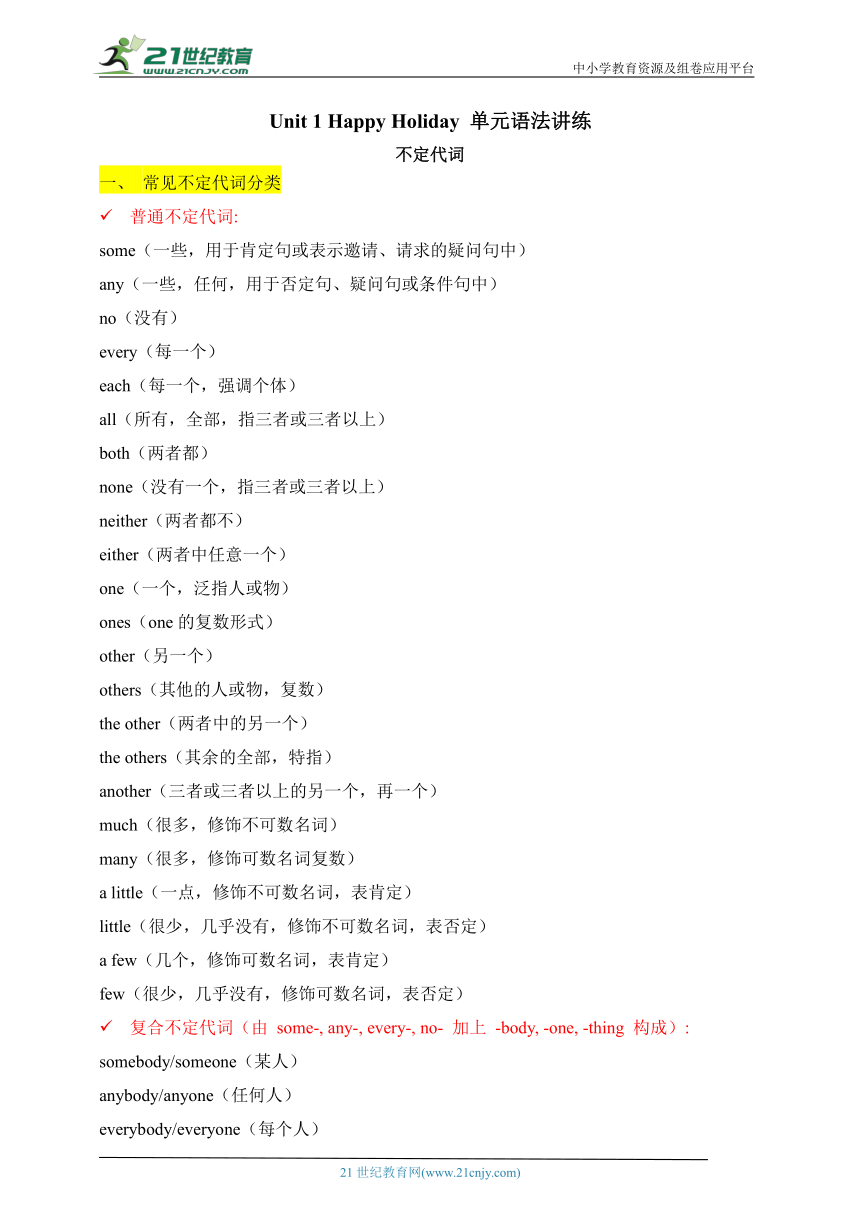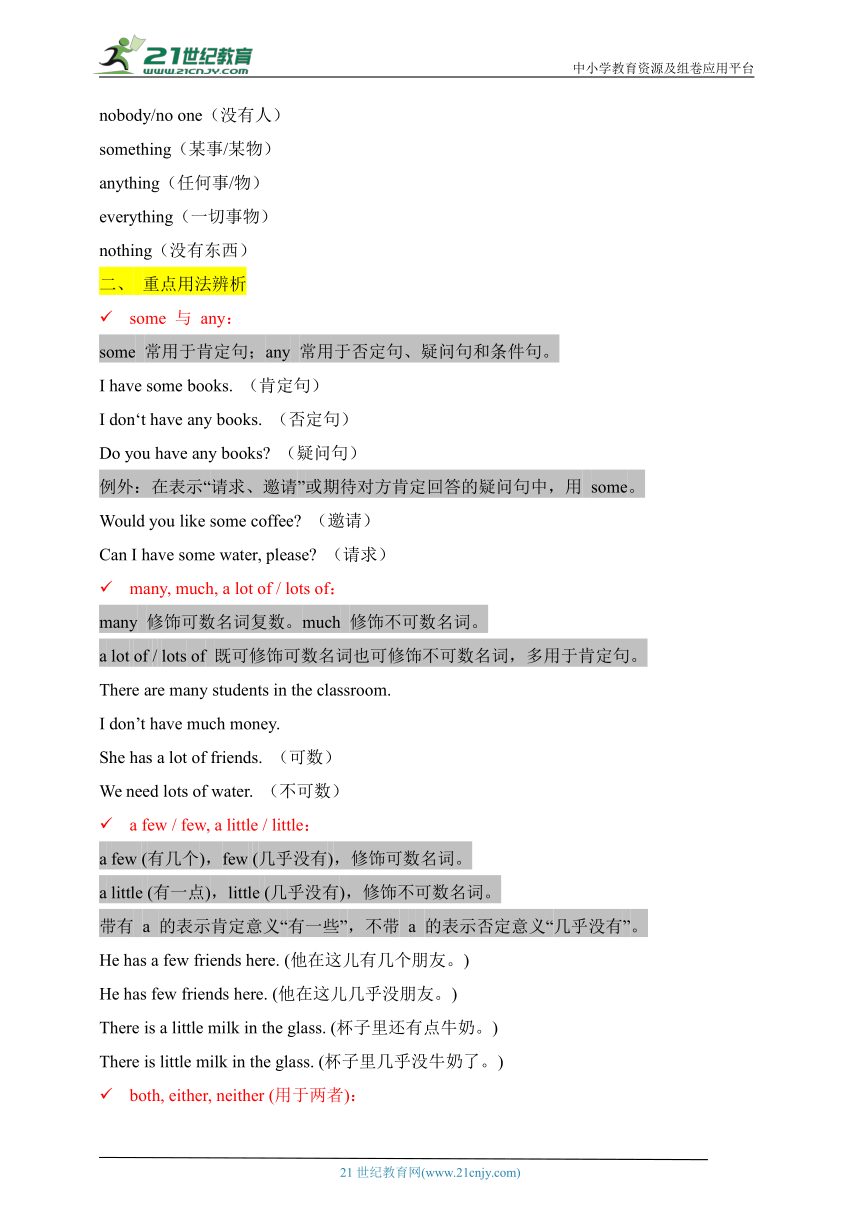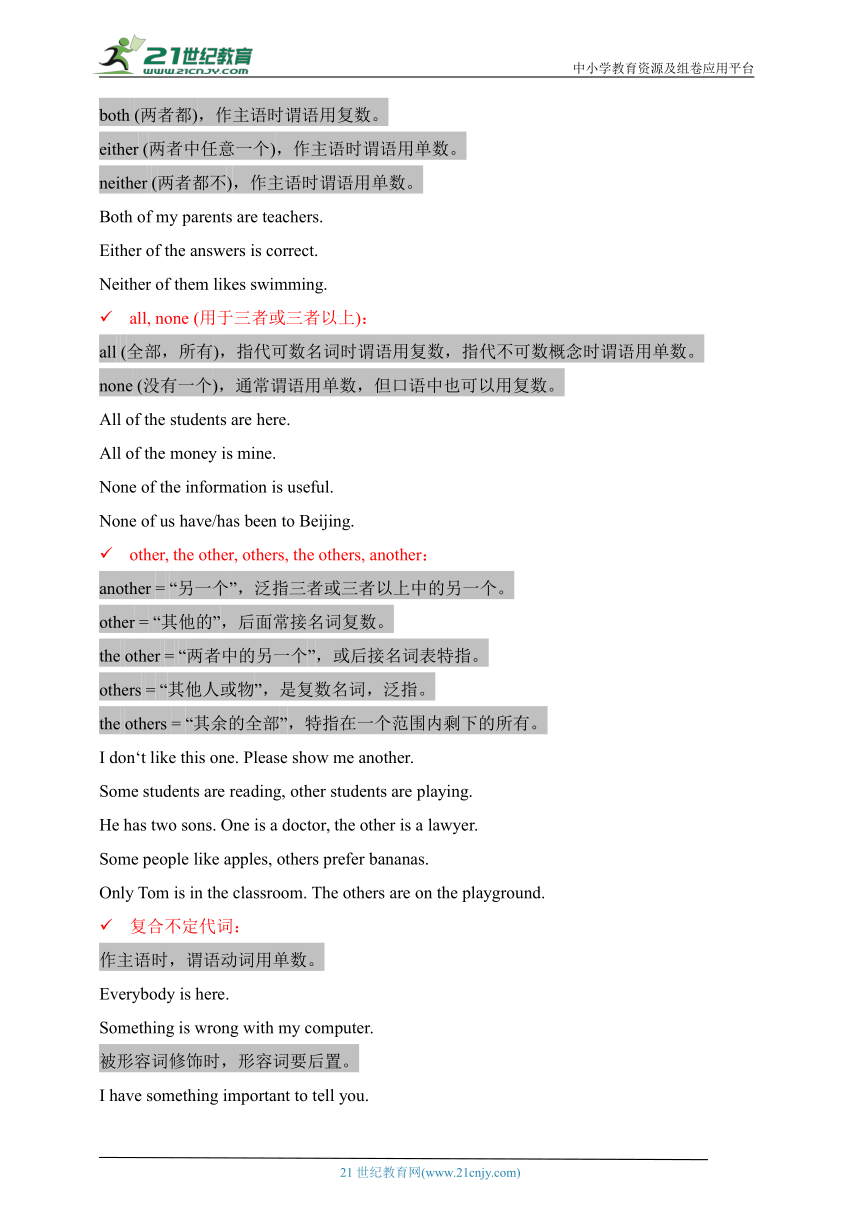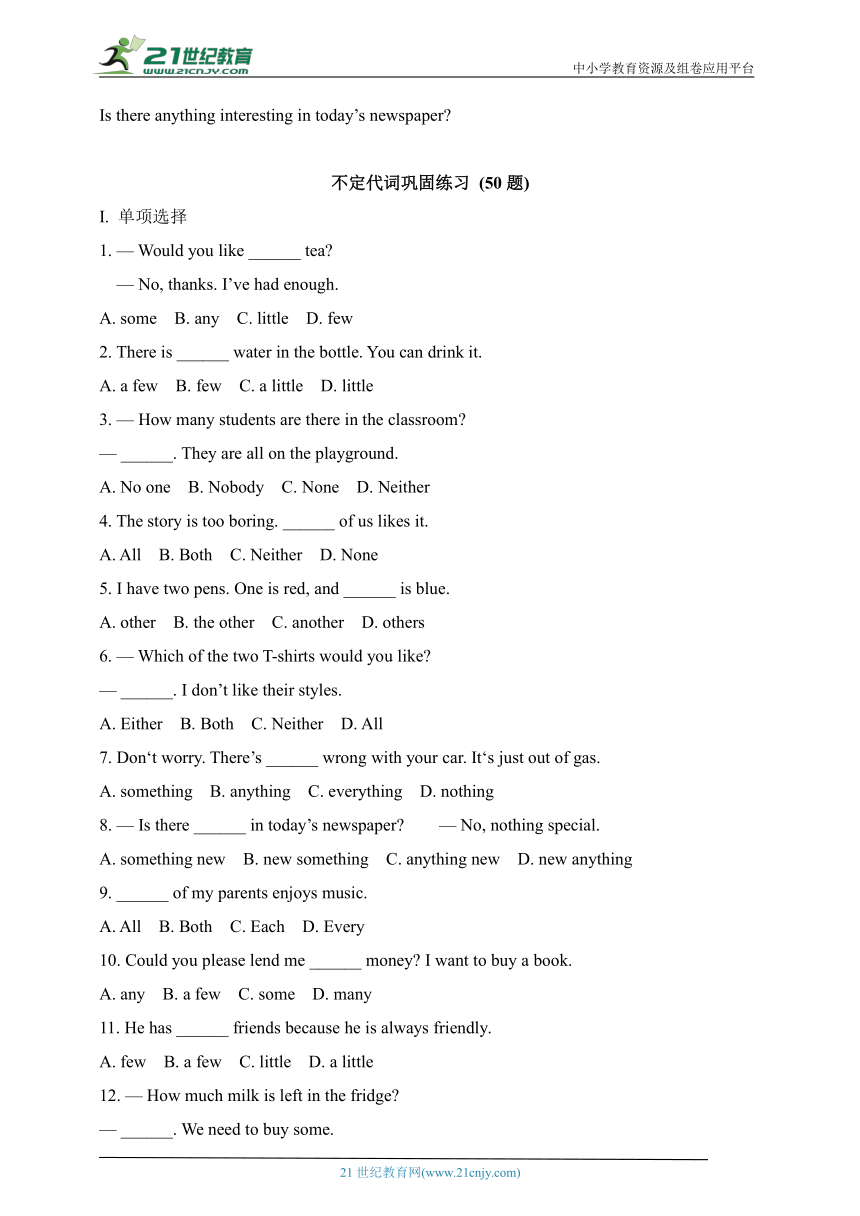Unit 1 Happy Holiday 单元语法讲练不定代词(含答案解析)—新人教八年级上册
文档属性
| 名称 | Unit 1 Happy Holiday 单元语法讲练不定代词(含答案解析)—新人教八年级上册 |  | |
| 格式 | doc | ||
| 文件大小 | 423.0KB | ||
| 资源类型 | 试卷 | ||
| 版本资源 | 人教版 | ||
| 科目 | 英语 | ||
| 更新时间 | 2025-08-25 19:56:09 | ||
图片预览




文档简介
中小学教育资源及组卷应用平台
Unit 1 Happy Holiday 单元语法讲练
不定代词
一、 常见不定代词分类
普通不定代词:
some(一些,用于肯定句或表示邀请、请求的疑问句中)
any(一些,任何,用于否定句、疑问句或条件句中)
no(没有)
every(每一个)
each(每一个,强调个体)
all(所有,全部,指三者或三者以上)
both(两者都)
none(没有一个,指三者或三者以上)
neither(两者都不)
either(两者中任意一个)
one(一个,泛指人或物)
ones(one的复数形式)
other(另一个)
others(其他的人或物,复数)
the other(两者中的另一个)
the others(其余的全部,特指)
another(三者或三者以上的另一个,再一个)
much(很多,修饰不可数名词)
many(很多,修饰可数名词复数)
a little(一点,修饰不可数名词,表肯定)
little(很少,几乎没有,修饰不可数名词,表否定)
a few(几个,修饰可数名词,表肯定)
few(很少,几乎没有,修饰可数名词,表否定)
复合不定代词(由 some-, any-, every-, no- 加上 -body, -one, -thing 构成):
somebody/someone(某人)
anybody/anyone(任何人)
everybody/everyone(每个人)
nobody/no one(没有人)
something(某事/某物)
anything(任何事/物)
everything(一切事物)
nothing(没有东西)
二、 重点用法辨析
some 与 any:
some 常用于肯定句;any 常用于否定句、疑问句和条件句。
I have some books. (肯定句)
I don‘t have any books. (否定句)
Do you have any books (疑问句)
例外:在表示“请求、邀请”或期待对方肯定回答的疑问句中,用 some。
Would you like some coffee (邀请)
Can I have some water, please (请求)
many, much, a lot of / lots of:
many 修饰可数名词复数。much 修饰不可数名词。
a lot of / lots of 既可修饰可数名词也可修饰不可数名词,多用于肯定句。
There are many students in the classroom.
I don’t have much money.
She has a lot of friends. (可数)
We need lots of water. (不可数)
a few / few, a little / little:
a few (有几个),few (几乎没有),修饰可数名词。
a little (有一点),little (几乎没有),修饰不可数名词。
带有 a 的表示肯定意义“有一些”,不带 a 的表示否定意义“几乎没有”。
He has a few friends here. (他在这儿有几个朋友。)
He has few friends here. (他在这儿几乎没朋友。)
There is a little milk in the glass. (杯子里还有点牛奶。)
There is little milk in the glass. (杯子里几乎没牛奶了。)
both, either, neither (用于两者):
both (两者都),作主语时谓语用复数。
either (两者中任意一个),作主语时谓语用单数。
neither (两者都不),作主语时谓语用单数。
Both of my parents are teachers.
Either of the answers is correct.
Neither of them likes swimming.
all, none (用于三者或三者以上):
all (全部,所有),指代可数名词时谓语用复数,指代不可数概念时谓语用单数。
none (没有一个),通常谓语用单数,但口语中也可以用复数。
All of the students are here.
All of the money is mine.
None of the information is useful.
None of us have/has been to Beijing.
other, the other, others, the others, another:
another = “另一个”,泛指三者或三者以上中的另一个。
other = “其他的”,后面常接名词复数。
the other = “两者中的另一个”,或后接名词表特指。
others = “其他人或物”,是复数名词,泛指。
the others = “其余的全部”,特指在一个范围内剩下的所有。
I don‘t like this one. Please show me another.
Some students are reading, other students are playing.
He has two sons. One is a doctor, the other is a lawyer.
Some people like apples, others prefer bananas.
Only Tom is in the classroom. The others are on the playground.
复合不定代词:
作主语时,谓语动词用单数。
Everybody is here.
Something is wrong with my computer.
被形容词修饰时,形容词要后置。
I have something important to tell you.
Is there anything interesting in today’s newspaper
不定代词巩固练习 (50题)
I. 单项选择
1. — Would you like ______ tea
— No, thanks. I’ve had enough.
A. some B. any C. little D. few
2. There is ______ water in the bottle. You can drink it.
A. a few B. few C. a little D. little
3. — How many students are there in the classroom
— ______. They are all on the playground.
A. No one B. Nobody C. None D. Neither
4. The story is too boring. ______ of us likes it.
A. All B. Both C. Neither D. None
5. I have two pens. One is red, and ______ is blue.
A. other B. the other C. another D. others
6. — Which of the two T-shirts would you like
— ______. I don’t like their styles.
A. Either B. Both C. Neither D. All
7. Don‘t worry. There’s ______ wrong with your car. It‘s just out of gas.
A. something B. anything C. everything D. nothing
8. — Is there ______ in today’s newspaper — No, nothing special.
A. something new B. new something C. anything new D. new anything
9. ______ of my parents enjoys music.
A. All B. Both C. Each D. Every
10. Could you please lend me ______ money I want to buy a book.
A. any B. a few C. some D. many
11. He has ______ friends because he is always friendly.
A. few B. a few C. little D. a little
12. — How much milk is left in the fridge
— ______. We need to buy some.
A. Nothing B. No one C. None D. Neither
13. I think ______ can learn how to swim. It‘s not difficult.
A. somebody B. anybody C. nobody D. everybody
14. There are many tall buildings on ______ sides of the street.
A. both B. all C. either D. every
15. — When shall we meet again, Thursday or Friday
— ______ day is OK. I’m free this week.
A. Either B. Every C. Both D. Neither
16. The exam was very difficult. ______ students passed it.
A. Few B. A few C. Little D. A little
17. We need ______ more chairs. These are not enough.
A. a few B. a little C. few D. little
18. — Who is in the room
— ______. They are all out.
A. Someone B. Anyone C. No one D. Everyone
19. I don‘t like this coat. Can you show me ______ one
A. other B. the other C. another D. others
20. ______ of the answers is correct. Would you like to try a third time
A. Both B. Neither C. Either D. All
II. 用适当的不定代词填空
21. I’m hungry. I want to eat __________.
22. Do you have __________ questions to ask
23. There are fifty students in our class. Thirty are boys, and __________ are girls.
24. She has two uncles. One is in China, and __________ is in America.
25. This cake is delicious! Would you like __________ piece
26. I can‘t find my keys __________. Did you see them
27. __________ is too difficult if you put your heart into it.
28. He knows __________ about Japanese culture. He lived in Tokyo for five years.
29. The box is empty. There’s __________ in it.
30. __________ of the twins went to the party. They were both sick.
31. There is __________ time left. We have to hurry up.
32. Could I have __________ water, please I‘m thirsty.
33. __________ of the money on the table is mine.
34. She is new here, so she has __________ friends.
35. I have __________ important to tell you after class.
36. — How many books did you read last month
— __________. I was too busy.
37. Some people like watching movies, __________ prefer reading books.
38. You can take __________ of the two seats. Both are free.
39. He didn’t make __________ mistakes in the test. He got full marks!
40. __________ of the students has a computer in our class.
III. 句型转换(用括号内的词改写句子,保持句意基本不变)
41. All the students are present today. (none)
→ ____________________ is absent today.
42. I don’t have any brothers or sisters. (no)
→ I have ____________________ brothers or sisters.
43. Not all the people like eating fast food. (some)
→ ________________ people like eating fast food, _________________ don’t.
44. The two answers are not right. (neither)
→ __________________ of the two answers _________________ right.
45. Would you like to have more soup (some)
→ Would you like ___________________ __________________ soup
46. I need to buy a new dictionary. (one)
→ I need to buy a new _________________.
47. All the other players are taller than me. (else)
→ __________ __________ is taller than me.
48. There isn’t any milk in the bottle. (no)
→ There is _________________ milk in the bottle.
49. Every student passed the exam. (none)
→ __________________ student failed the exam.
50. Can you give me another book (other)
→ Can you give me _________________ book
练习题答案与解析
I. 单项选择
1. A 【解析】表示邀请的疑问句中,用some。
2. C 【解析】water是不可数名词,且句意是肯定的“还有一点”,用a little。
3. C 【解析】回答how many提问的“数量为0”,用none。no one/nobody不能接of结构,且常回答who的提问。
4. D 【解析】“我们所有人都不喜欢”,三者或三者以上用none。
5. B 【解析】“两个中的另一个”,用the other。
6. C 【解析】“我都不喜欢”,两者否定用neither。
7. D 【解析】“没什么毛病”,用nothing。
8. C 【解析】疑问句中用anything,且形容词new要后置。
9. C 【解析】父母是两个人,但谓语enjoys是单数,强调“每一个”,用each。both后接复数动词。
10. C 【解析】表示请求的疑问句中,用some。
11. B 【解析】friends是可数名词复数,且句意是肯定的“有一些朋友”,用a few。
12. C 【解析】回答how much提问的“数量为0”,用none。
13. B 【解析】“任何人都能学会”,用anybody。
14. A 【解析】街只有“两边”,用both。
15. A 【解析】“周四或周五,哪一天都可以”,两者中任选一个用either。
16. A 【解析】“考试难,几乎没人通过”,students是可数名词,表否定用few。
17. A 【解析】chairs是可数名词,且需要“再多几把”,表肯定用a few。
18. C 【解析】“没人在房间里”,用no one。
19. C 【解析】“再拿一件给我看”,泛指多个中的另一个用another。
20. B 【解析】“两个答案都不对”,两者否定用neither。
II. 用适当的不定代词填空
21. something 【解析】想吃“某样东西”,肯定句用something。
22. any 【解析】疑问句中用any。
23. the others 【解析】“剩下的全部女生”,特指范围内剩下的全部,用the others。
24. the other 【解析】“两个叔叔中的另一个”,用the other。
25. another 【解析】“再来一块”,用another。
26. anywhere 【解析】“哪儿都找不到”,否定句中用anywhere。(此题超纲一点,但常见)
27. Nothing 【解析】“世上无难事”,用Nothing。
28. a lot / much 【解析】“对日本文化了解很多”,knowledge不可数,用a lot / much。
29. nothing 【解析】“空的,里面什么也没有”,用nothing。
30. Neither 【解析】“双胞胎都没去”,两者否定用Neither。
31. little 【解析】“没时间了,要赶快”,time不可数,表否定用little。
32. some 【解析】表示请求的疑问句中,用some。
33. All 【解析】“桌子上所有的钱都是我的”,money不可数,用All。
34. few 【解析】“新来的,所以没什么朋友”,friends可数,表否定用few。
35. something 【解析】“有重要的事”,肯定句,且形容词important后置,用something。
36. None 【解析】“一本都没读”,回答数量,用None。
37. others 【解析】“一些人...,另一些人...”,泛指其他人,用others。
38. either 【解析】“两个座位随便坐哪个”,两者中任选一个用either。
39. any 【解析】否定句中用any。
40. Each / Every 【解析】“每个学生都有一台电脑”,强调个体,用Each或Every。
III. 句型转换
41. None of the students 【解析】全部在场 = 没人缺席。
42. no 【解析】not any = no。
43. Some; others 【解析】不是所有人都喜欢 = 有些人喜欢,有些人不喜欢。
44. Neither; is 【解析】两个都不对 = 两个中没有一个是对的。
45. some more 【解析】more 前可以用 some 修饰。
46. one 【解析】one 可以替代前面提到的可数名词单数 (dictionary),避免重复。
47. Everyone else / Everybody else 【解析】所有其他的人 = 其他每一个人。
48. no 【解析】not any = no。
49. No 【解析】所有人都通过了 = 没有人失败。
50. a different 【解析】another = a different。 (此题是另一种思路的转换)
21世纪教育网 www.21cnjy.com 精品试卷·第 2 页 (共 2 页)
HYPERLINK "http://21世纪教育网(www.21cnjy.com)
" 21世纪教育网(www.21cnjy.com)
Unit 1 Happy Holiday 单元语法讲练
不定代词
一、 常见不定代词分类
普通不定代词:
some(一些,用于肯定句或表示邀请、请求的疑问句中)
any(一些,任何,用于否定句、疑问句或条件句中)
no(没有)
every(每一个)
each(每一个,强调个体)
all(所有,全部,指三者或三者以上)
both(两者都)
none(没有一个,指三者或三者以上)
neither(两者都不)
either(两者中任意一个)
one(一个,泛指人或物)
ones(one的复数形式)
other(另一个)
others(其他的人或物,复数)
the other(两者中的另一个)
the others(其余的全部,特指)
another(三者或三者以上的另一个,再一个)
much(很多,修饰不可数名词)
many(很多,修饰可数名词复数)
a little(一点,修饰不可数名词,表肯定)
little(很少,几乎没有,修饰不可数名词,表否定)
a few(几个,修饰可数名词,表肯定)
few(很少,几乎没有,修饰可数名词,表否定)
复合不定代词(由 some-, any-, every-, no- 加上 -body, -one, -thing 构成):
somebody/someone(某人)
anybody/anyone(任何人)
everybody/everyone(每个人)
nobody/no one(没有人)
something(某事/某物)
anything(任何事/物)
everything(一切事物)
nothing(没有东西)
二、 重点用法辨析
some 与 any:
some 常用于肯定句;any 常用于否定句、疑问句和条件句。
I have some books. (肯定句)
I don‘t have any books. (否定句)
Do you have any books (疑问句)
例外:在表示“请求、邀请”或期待对方肯定回答的疑问句中,用 some。
Would you like some coffee (邀请)
Can I have some water, please (请求)
many, much, a lot of / lots of:
many 修饰可数名词复数。much 修饰不可数名词。
a lot of / lots of 既可修饰可数名词也可修饰不可数名词,多用于肯定句。
There are many students in the classroom.
I don’t have much money.
She has a lot of friends. (可数)
We need lots of water. (不可数)
a few / few, a little / little:
a few (有几个),few (几乎没有),修饰可数名词。
a little (有一点),little (几乎没有),修饰不可数名词。
带有 a 的表示肯定意义“有一些”,不带 a 的表示否定意义“几乎没有”。
He has a few friends here. (他在这儿有几个朋友。)
He has few friends here. (他在这儿几乎没朋友。)
There is a little milk in the glass. (杯子里还有点牛奶。)
There is little milk in the glass. (杯子里几乎没牛奶了。)
both, either, neither (用于两者):
both (两者都),作主语时谓语用复数。
either (两者中任意一个),作主语时谓语用单数。
neither (两者都不),作主语时谓语用单数。
Both of my parents are teachers.
Either of the answers is correct.
Neither of them likes swimming.
all, none (用于三者或三者以上):
all (全部,所有),指代可数名词时谓语用复数,指代不可数概念时谓语用单数。
none (没有一个),通常谓语用单数,但口语中也可以用复数。
All of the students are here.
All of the money is mine.
None of the information is useful.
None of us have/has been to Beijing.
other, the other, others, the others, another:
another = “另一个”,泛指三者或三者以上中的另一个。
other = “其他的”,后面常接名词复数。
the other = “两者中的另一个”,或后接名词表特指。
others = “其他人或物”,是复数名词,泛指。
the others = “其余的全部”,特指在一个范围内剩下的所有。
I don‘t like this one. Please show me another.
Some students are reading, other students are playing.
He has two sons. One is a doctor, the other is a lawyer.
Some people like apples, others prefer bananas.
Only Tom is in the classroom. The others are on the playground.
复合不定代词:
作主语时,谓语动词用单数。
Everybody is here.
Something is wrong with my computer.
被形容词修饰时,形容词要后置。
I have something important to tell you.
Is there anything interesting in today’s newspaper
不定代词巩固练习 (50题)
I. 单项选择
1. — Would you like ______ tea
— No, thanks. I’ve had enough.
A. some B. any C. little D. few
2. There is ______ water in the bottle. You can drink it.
A. a few B. few C. a little D. little
3. — How many students are there in the classroom
— ______. They are all on the playground.
A. No one B. Nobody C. None D. Neither
4. The story is too boring. ______ of us likes it.
A. All B. Both C. Neither D. None
5. I have two pens. One is red, and ______ is blue.
A. other B. the other C. another D. others
6. — Which of the two T-shirts would you like
— ______. I don’t like their styles.
A. Either B. Both C. Neither D. All
7. Don‘t worry. There’s ______ wrong with your car. It‘s just out of gas.
A. something B. anything C. everything D. nothing
8. — Is there ______ in today’s newspaper — No, nothing special.
A. something new B. new something C. anything new D. new anything
9. ______ of my parents enjoys music.
A. All B. Both C. Each D. Every
10. Could you please lend me ______ money I want to buy a book.
A. any B. a few C. some D. many
11. He has ______ friends because he is always friendly.
A. few B. a few C. little D. a little
12. — How much milk is left in the fridge
— ______. We need to buy some.
A. Nothing B. No one C. None D. Neither
13. I think ______ can learn how to swim. It‘s not difficult.
A. somebody B. anybody C. nobody D. everybody
14. There are many tall buildings on ______ sides of the street.
A. both B. all C. either D. every
15. — When shall we meet again, Thursday or Friday
— ______ day is OK. I’m free this week.
A. Either B. Every C. Both D. Neither
16. The exam was very difficult. ______ students passed it.
A. Few B. A few C. Little D. A little
17. We need ______ more chairs. These are not enough.
A. a few B. a little C. few D. little
18. — Who is in the room
— ______. They are all out.
A. Someone B. Anyone C. No one D. Everyone
19. I don‘t like this coat. Can you show me ______ one
A. other B. the other C. another D. others
20. ______ of the answers is correct. Would you like to try a third time
A. Both B. Neither C. Either D. All
II. 用适当的不定代词填空
21. I’m hungry. I want to eat __________.
22. Do you have __________ questions to ask
23. There are fifty students in our class. Thirty are boys, and __________ are girls.
24. She has two uncles. One is in China, and __________ is in America.
25. This cake is delicious! Would you like __________ piece
26. I can‘t find my keys __________. Did you see them
27. __________ is too difficult if you put your heart into it.
28. He knows __________ about Japanese culture. He lived in Tokyo for five years.
29. The box is empty. There’s __________ in it.
30. __________ of the twins went to the party. They were both sick.
31. There is __________ time left. We have to hurry up.
32. Could I have __________ water, please I‘m thirsty.
33. __________ of the money on the table is mine.
34. She is new here, so she has __________ friends.
35. I have __________ important to tell you after class.
36. — How many books did you read last month
— __________. I was too busy.
37. Some people like watching movies, __________ prefer reading books.
38. You can take __________ of the two seats. Both are free.
39. He didn’t make __________ mistakes in the test. He got full marks!
40. __________ of the students has a computer in our class.
III. 句型转换(用括号内的词改写句子,保持句意基本不变)
41. All the students are present today. (none)
→ ____________________ is absent today.
42. I don’t have any brothers or sisters. (no)
→ I have ____________________ brothers or sisters.
43. Not all the people like eating fast food. (some)
→ ________________ people like eating fast food, _________________ don’t.
44. The two answers are not right. (neither)
→ __________________ of the two answers _________________ right.
45. Would you like to have more soup (some)
→ Would you like ___________________ __________________ soup
46. I need to buy a new dictionary. (one)
→ I need to buy a new _________________.
47. All the other players are taller than me. (else)
→ __________ __________ is taller than me.
48. There isn’t any milk in the bottle. (no)
→ There is _________________ milk in the bottle.
49. Every student passed the exam. (none)
→ __________________ student failed the exam.
50. Can you give me another book (other)
→ Can you give me _________________ book
练习题答案与解析
I. 单项选择
1. A 【解析】表示邀请的疑问句中,用some。
2. C 【解析】water是不可数名词,且句意是肯定的“还有一点”,用a little。
3. C 【解析】回答how many提问的“数量为0”,用none。no one/nobody不能接of结构,且常回答who的提问。
4. D 【解析】“我们所有人都不喜欢”,三者或三者以上用none。
5. B 【解析】“两个中的另一个”,用the other。
6. C 【解析】“我都不喜欢”,两者否定用neither。
7. D 【解析】“没什么毛病”,用nothing。
8. C 【解析】疑问句中用anything,且形容词new要后置。
9. C 【解析】父母是两个人,但谓语enjoys是单数,强调“每一个”,用each。both后接复数动词。
10. C 【解析】表示请求的疑问句中,用some。
11. B 【解析】friends是可数名词复数,且句意是肯定的“有一些朋友”,用a few。
12. C 【解析】回答how much提问的“数量为0”,用none。
13. B 【解析】“任何人都能学会”,用anybody。
14. A 【解析】街只有“两边”,用both。
15. A 【解析】“周四或周五,哪一天都可以”,两者中任选一个用either。
16. A 【解析】“考试难,几乎没人通过”,students是可数名词,表否定用few。
17. A 【解析】chairs是可数名词,且需要“再多几把”,表肯定用a few。
18. C 【解析】“没人在房间里”,用no one。
19. C 【解析】“再拿一件给我看”,泛指多个中的另一个用another。
20. B 【解析】“两个答案都不对”,两者否定用neither。
II. 用适当的不定代词填空
21. something 【解析】想吃“某样东西”,肯定句用something。
22. any 【解析】疑问句中用any。
23. the others 【解析】“剩下的全部女生”,特指范围内剩下的全部,用the others。
24. the other 【解析】“两个叔叔中的另一个”,用the other。
25. another 【解析】“再来一块”,用another。
26. anywhere 【解析】“哪儿都找不到”,否定句中用anywhere。(此题超纲一点,但常见)
27. Nothing 【解析】“世上无难事”,用Nothing。
28. a lot / much 【解析】“对日本文化了解很多”,knowledge不可数,用a lot / much。
29. nothing 【解析】“空的,里面什么也没有”,用nothing。
30. Neither 【解析】“双胞胎都没去”,两者否定用Neither。
31. little 【解析】“没时间了,要赶快”,time不可数,表否定用little。
32. some 【解析】表示请求的疑问句中,用some。
33. All 【解析】“桌子上所有的钱都是我的”,money不可数,用All。
34. few 【解析】“新来的,所以没什么朋友”,friends可数,表否定用few。
35. something 【解析】“有重要的事”,肯定句,且形容词important后置,用something。
36. None 【解析】“一本都没读”,回答数量,用None。
37. others 【解析】“一些人...,另一些人...”,泛指其他人,用others。
38. either 【解析】“两个座位随便坐哪个”,两者中任选一个用either。
39. any 【解析】否定句中用any。
40. Each / Every 【解析】“每个学生都有一台电脑”,强调个体,用Each或Every。
III. 句型转换
41. None of the students 【解析】全部在场 = 没人缺席。
42. no 【解析】not any = no。
43. Some; others 【解析】不是所有人都喜欢 = 有些人喜欢,有些人不喜欢。
44. Neither; is 【解析】两个都不对 = 两个中没有一个是对的。
45. some more 【解析】more 前可以用 some 修饰。
46. one 【解析】one 可以替代前面提到的可数名词单数 (dictionary),避免重复。
47. Everyone else / Everybody else 【解析】所有其他的人 = 其他每一个人。
48. no 【解析】not any = no。
49. No 【解析】所有人都通过了 = 没有人失败。
50. a different 【解析】another = a different。 (此题是另一种思路的转换)
21世纪教育网 www.21cnjy.com 精品试卷·第 2 页 (共 2 页)
HYPERLINK "http://21世纪教育网(www.21cnjy.com)
" 21世纪教育网(www.21cnjy.com)
同课章节目录
